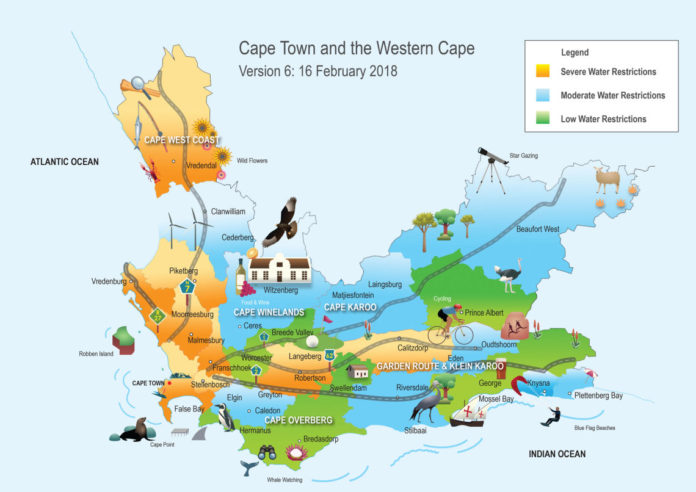
A partnership of tourism focussed organisations, the City of Cape Town and the Western Cape Government have launched a microsite (www.waterwesterncape.co.za) to assist the tourism trade in answering important questions that prospective visitors may have on the drought in Cape Town and the Western Cape, and to provide the trade with up to date information relevant to their businesses.
Its key objective is to get a single, unified message out that the Cape is open for businesses, and that tourists must come and enjoy, but be mindful of the drought when visiting.
The tourism bodies include Wesgro – Cape Town and the Western Cape’s Official Tourism, Trade and Investment Promotion Agency, Cape Town Tourism, South African Tourism, SAACI, SATSA, and Fedhasa.
The launch of the microsite followed negative international media coverage of the drought, which caused concerns for potential tourists. It was therefore critical that accurate information was disseminated, and that international tourists understood the importance of their travel plans to the economy of the province.
Indeed, tourism supports over 300,000 jobs in the Western Cape, if indirect and induced jobs are included. It also contributes nearly R40 billion to the provincial economy. Because international tourists only add 1% to the population of the Cape on average at any given point (during peak season), tourists can rest assured that they will only provide a positive benefit to the province during this time, provided they save like a local.
Wesgro CEO, Tim Harris said: “Our water communications centre has been working hard to provide concise information to the tourism trade, and potential visitors to the Cape, so that the impact of the drought on this important sector is as limited as possible. This microsite places all this information in an easily accessible format for the industry to use. We are also engaging with international media so that their coverage on the drought is balanced and fair, and does not cause unnecessary fear about visiting the province during this time. Wesgro is determined to keep this sector going, and growing so that it continues supports economic growth and job creation.”
JAMMS lead chairperson, Enver Mally added: “In this time of crisis it is important that we all work together to combat what is a serious threat to our industry, which in reality is made up of people, families and businesses. The jobs of 300 000 people are at stake many of whom are employed by members of organisations represented by JAMMS (Cape Town Tourism, FEDHASA,SAACI,SATSA). It is therefore crucial that we get the correct messaging out there not only to people in the industry, but also to our international market and the world at large. Fear mongering and sensationalist stories unsubstantiated by facts threaten the livelihoods of real people and do much to damage the reputation of what is a world class destination. It is therefore imperative that we send out a unified message that Cape Town is indeed open for business and that the best way to support us through this crisis is to come to Cape Town and spend money like a visitor and save water like a local.”
The Deputy Mayor of the City of Cape Town, Ian Nielson said: “Tourists should rest assured that their presence in Cape Town will not have any detrimental impact on our water supply. In fact, staying away would be more detrimental, as the tourism sector is a significant mainstay of Cape Town’s economy. We are working hard to ensure that the drought crisis does not spiral into an economic crisis, and are very encouraged by measures the tourism industry has introduced to lower their consumption and drive the water-savings message. The City’s initiatives to drive down consumption, including a widespread communications campaign, pressure reduction across the City, and the installation of water meters to limit high consumption, are all starting to bear fruit. Our water augmentation programmes are also on track to ensure that we become more resilient in the future.”
Minister Alan Winde added “tourism is an essential part of our economy and a key contributor to job creation so we welcome this step to ensure that our visitors are getting up to date, reliable information. We welcome all visitors to our province and urge them to use this precious resource sparingly because saving water while they are here will save jobs in the industry.”
“In addition to this microsite, we will also be launching a digital marketing campaign reaching potential visitors in key source markets who have shown interest in travelling to Cape Town and the Western Cape” concluded Harris.

